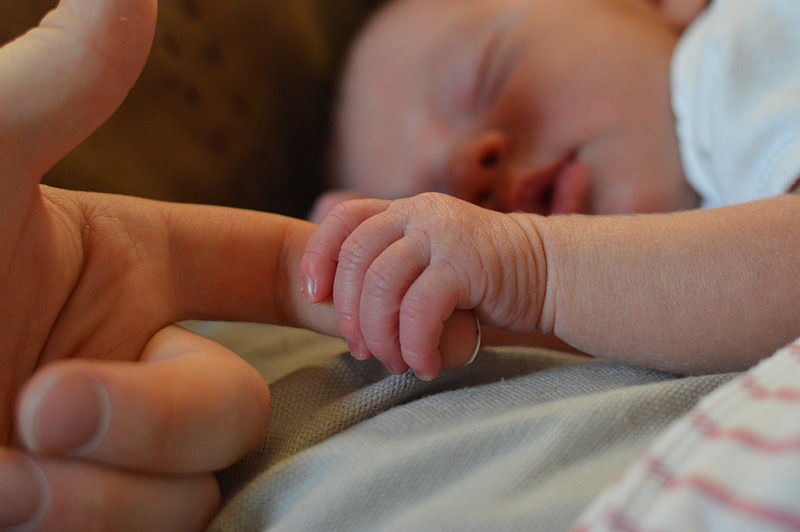
Jo Tantum is the UK’s leading Sleep Expert who specialises in baby sleep. We asked her about the most common myths surrounding getting your baby to sleep, to help sleep deprived parents to gain back some much needed hours of shut-eye.
Myth 1: “You should sleep when your baby sleeps”
Many parents are told this when pregnant, which sounds great. Babies sleep a lot, right?! So you will catch up on your sleep, and won’t be tired?
This advice isn’t necessarily correct. What no-one tells you is that sometimes your baby only sleeps for short stretches in the day, so just as you are snuggling down for a snooze, he or she is likely to wake up.
In fact, it is most likely your baby will usually only sleep well on the day that you give up on trying to sleep when they sleep, and instead do the laundry, load the dishwasher and clean your home. Then, and only then will they have a lovely long sleep of 2 hours! To take a silver lining, at least your dishes are shiny!
What to do: My advice is to get an early night, and get your other half, or someone close to you, to do the dream feed.
Myth 2: “The less sleep your baby has in the day, the more they will sleep at night”
How many times have we heard this? From grandparents to mother-in-laws, and strangers in the supermarket, they all recommend this one. But this is a bad piece of advice. The truth is that if they have less sleep in the day, they will become overtired, and your baby will crash into a deep sleep during the first part of the night, and will then wake up more often throughout the night. If your child is well rested during the day, then they won’t be overtired and grumpy at night. A child with less sleep can also take longer to get to sleep at bedtime as they are overstimulated. They will be awake for longer periods in the night as they struggle to get back to sleep, a little bit like us when we have things on our minds.
What to do: The moral of the story is to make sure your baby has plenty of good naps in the day, and their bedtime sleep will be better as a result.
Myth 3: “Dream feeds don’t work”
I’ve been using the dream feed technique for many years. A dream feed is a feed you wake your baby up for just before you go to bed, so both of you can get a longer period of sleep. I use it for younger and older infants when they are waking up often in the night.
Babies will have one “long” sleep within 24 hours. The length of sleep increases as they grow. For newborns, the average “long” sleep is usually 3-4 hours, but this then gets longer as they get older and take more milk.
What to do: It makes sense that you get some quality sleep during your baby’s “long sleep”. Once breastfeeding is established, the dream feed can then be done from a bottle so your partner can have some bonding time with their little one, while mummy sleeps.
Note: I don’t do a dream feed if a baby has digestive issues or reflux as the more they feed, the more they wake.
Myth 4: “Keeping a baby up late will help them sleep longer and wake later in the morning”
Similar to myth 2, this is one you will hear from people trying to give you well-meaning advice because it may have worked for them. But as mentioned previously, when babies are overtired they will wake up throughout the night.
In fact, it’s the opposite which often works better. By putting your child to bed early, it can often stop early morning waking after a week or so.
What to do: Don’t keep your baby up late. If you keep your infant up late, you will find it will take you longer to settle them to sleep. This scenario is most apparent with toddlers; they will run around as though they aren’t tired, but this is a classic case of overtiredness.
Myth 5: “If you wean early, your baby will start to sleep better”
The number of times I’ve had emails from desperate parents who have weaned early and still their baby doesn’t sleep, are countless!
The guideline is to not wean until six months unless a paediatrician/dietician advises otherwise. For example, babies with reflux are usually recommended to be weaned earlier.
So if your child isn’t sleeping well, or is often waking at night, then seeking help by weaning early isn’t a good solution.
What to do: Avoid weaning early. Newborn’s need to learn how to sleep by themselves (which is best achieved in the daytime).
Myth 6: “Breastfed babies don’t sleep through the night as soon as formula fed babies do”
I was a maternity nurse for ten years, and 90% of the babies I cared for were breastfed. They all slept well, settled well at night and continued to stretch the lengths of sleep they had. They all continued to sleep well once I had left, too.
As long as your baby is taught how to get to sleep without sleeping props like feeding, rocking, patting and a pacifier, then they will continue to sleep well, whether breast or bottle fed.
What to do: Find what works best for you. Some parents like to give a formula feed at the dream feed as it can sometimes help your baby have a longer stretch of sleep.
Myth 7: “Babies will sleep better once they are crawling or walking”
If you have a baby who doesn’t sleep well, then you will look for the reasons why. Often you hear ‘once a baby is 12 weeks old things will settle’. You get to 12 weeks, and they are still just as bad!
You are then told ‘once they are weaned they will sleep better’, but you get to that point, and sleeping is still the same. You might also be told that children will settle when they are crawling or walking. By this stage, you have given up hope of ever having a good night’s sleep ever again.
What to do: Don’t wait until these milestones arrive to change your baby’s bad sleeping habits. Do it now and they will improve quickly. Teaching a child healthy sleep habits as soon as possible means they won’t pick up on bad sleep habits over time.
If your child is often waking in the night and not getting many naps during the day, they may have reflux or a digestive issue which could be aggravated by cow’s milk or they might have a protein allergy, so go and see you GP to be referred to a paediatrician.
Myth 8: “Babies’ ‘colic’ symptoms will stop at three months, and they will sleep better”
I have never liked the word colic – its definition is basically, ‘unexplained crying’. But babies don’t cry for no reason; there is always something wrong, and we need to find out what that is. Wind and digestive issues can often be the case with new babies. Children are born with an immature digestive system, so breastfed babies can have awful wind depending on what the mother has eaten.
What to do: Start a food diary to solve the wind issue. If your child is often waking in the night and always seems uncomfortable during and after a feed, go to see your GP because it may be reflux or CMPA and you will often need to see a paediatrician or gastroenterologist as well.
Myth 9: “Getting your baby into a routine will mean you have to stay in all the time”
This advice is a huge myth. The mum’s that follow my flexible routines all plan their days; they go to music classes and swimming, and their little ones are still well rested and well fed.
Being in a routine doesn’t mean it’s rigid and you have to stick to the minute on times. It means you can organise your day in between feeds and naps so that your baby enjoys their time out, classes or play dates instead of being tired or hungry.
What to do: The best way to work out a flexible routine based on your baby’s natural patterns is a 48-hour log. Write down your baby’s feed times and nap times. If they took ages to settle then they were overtired, so bring the naps closer together. If they are often feeding, it may be a case that they are tired instead of hungry so try a nap. You will soon start to see patterns emerging, and then you can write a routine tailor-made to your baby.
Myth 10: “Giving a pacifier to a baby means they must always have one to help them sleep”
A pacifier or dummy is a ‘marmite’ object; you either love them or hate them.
I know parents who are upset when their little one doesn’t take one.
I often use a dummy as a tool. I use one if I look after a ‘sucky’ baby who is using mum as a pacifier or I use one if we need to stretch the night feeds, so they don’t get upset.
What to do: I always take the dummy or pacifier off a baby before they fall asleep, as if they fall asleep with it often they will start to see it as a sleep prop. And often, as little ones can’t put it back into their mouth, then you are left having to go back and forth all night popping it back in!
If you have any questions, you can find Jo’s contact information at www.jotantum.com
By Jo Tantum, UK’s leading Sleep Expert

This articles expresses the views of the author alone and does not necessarily reflect the views of Shepherds Friendly Society


